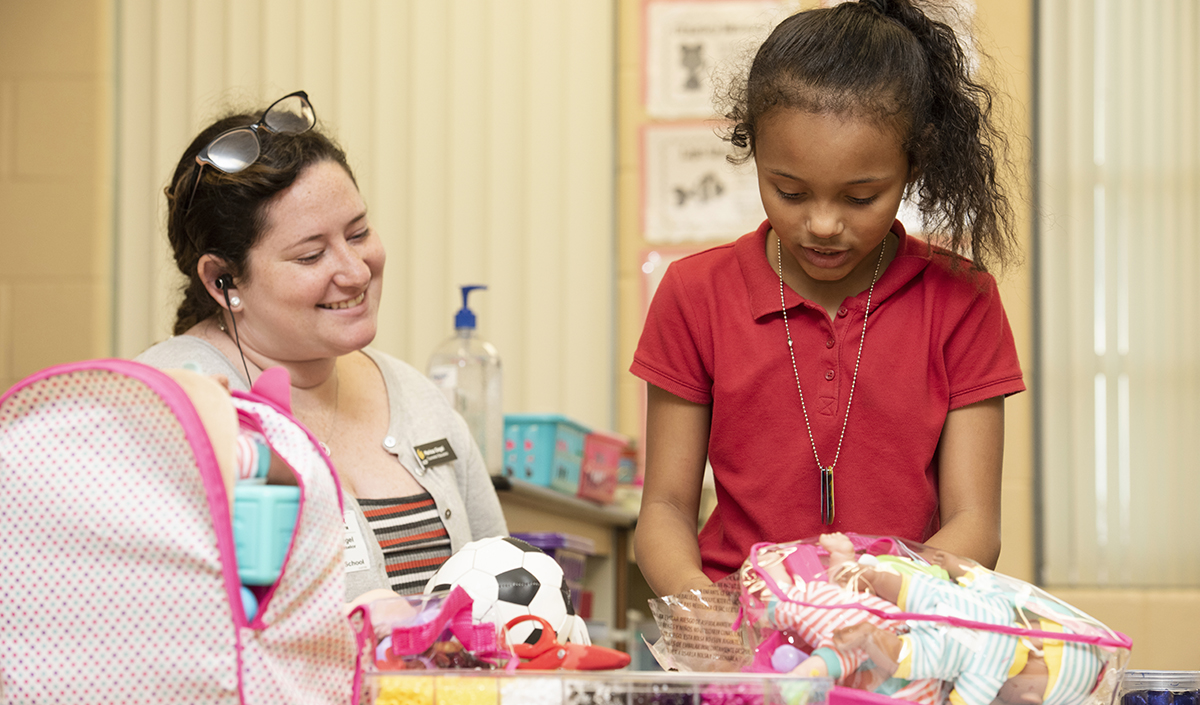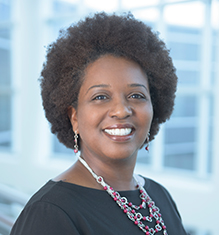UCF counselor education students gain meaningful, supervised experience while providing accessible counseling services at no cost to K-5 students and their families.

Counselor education students provided in-person counseling at three elementary schools prior to the COVID-19 pandemic. Once schools moved to remote instruction, they offered telehealth counseling so clients could continue receiving care remotely. (Photo by Amy Floyd) Photo was taken prior to the COVID-19 pandemic.
One in five children in America show signs of a mental health disorder, and of these children, only 20% receive care from a specialized mental health provider, according to the Centers for Disease Control and Prevention.
And that was before the COVID-19 pandemic.
There is some good news, though. The UCF counselor education program was already partnering with Seminole County Public Schools to offer school-based mental health counseling to students in three of the county’s Title I elementary schools. Each semester, two graduate assistants work closely with administrators and school counselors at Hamilton, Midway and Pine Crest elementary schools to identify K-5 students and families interested in counseling services. Once schools moved to remote instruction, the ongoing partnership started offering telehealth counseling, which allows children to continue care during the pandemic and within the familiarity of their own homes.
The purpose of the partnership with Seminole County Public Schools is to provide accessible counseling services at no cost to K-5 students and their families within their own community, promoting academic, personal and social development. In addition, the partnership provides graduate counseling students experience working with children through the schools, while under the direct supervision of a credentialed clinical supervisor.
 Richelle Joe, assistant professor of counselor education
Richelle Joe, assistant professor of counselor education
Richelle Joe, assistant professor of counselor education, says prior to the pandemic, existing barriers to mental health counseling for children might include limited transportation, lack of financial resources, insufficient availability of services and the stigma associated with counseling. Offering these services through schools made counseling more accessible and helped normalize counseling as an integral part of their school.
“And our ongoing partnership with Seminole County Public Schools continues to address barriers such as access and stigma. Because we work closely with school personnel, the children and their families trust that we have their best interests in mind.”
Joe says, like everyone, the children and families they serve have been financially and psychologically affected by the pandemic. Concerns about lost wages or lost jobs affect family systems and can add more stress, compounding anxiety about COVID-19.
“There has been quite a bit of uncertainty in the last year, which has translated into difficulties at home, and at school for some students.”
Some children found remote learning academically challenging and socially isolating, says Joe. And now that more in-person education is taking place, students and their families are having to adjust again. “The UCF students working with families have had to operate with an increased level of empathy and patience. Understanding and flexibility have been critical with so much uncertainty.”
Along with serving an unmet need in communities, clinical mental health counseling and school counseling graduate students gain real-life experience working in the schools with elementary-age children for 45-minute sessions once a week.
Lara Kjeldsen, who is pursuing her master’s degree in clinical mental health counseling, says she applied what she learned in play therapy courses to find innovative ways to engage her client virtually. “My play therapy courses really helped. A large part of play therapy is letting the child play, letting them act out whatever they need to. Since distancing meant children lacked access to play therapy toys, we were able to use video games. I tracked my client’s moves, and we’d reflect on why he made particular choices. My client really opened up that way.”
Alexa Iniguez, who is pursuing a master’s degree in school counseling, says she learned how to be flexible. “It can be challenging for anyone to have a counseling session by webcam, let alone as an energetic, fun-loving kid. So instead of facing the camera, my client might be dancing around their room, introducing me to their favorite things. In the end, these were all opportunities to connect.”
Joe says for school counseling students, the partnership offered opportunities to strengthen an understanding of their own students’ unique needs and preferences in a school setting.
“I think in an educational environment, we may forget school counselors have specialized training, not to push paper but to use those skills for the benefit of students,” says Joe.
Belindha Russell, also pursuing a master’s degree in school counseling, says her biggest strength as a former social studies teacher was forming positive relationships with her students. As a result, students sought out her personal and academic advice, and at times, this meant reaching out to school counselors. “The more I worked with school counselors, the more I began to understand the importance of their role. School counselors contribute to students’ academic, social, emotional and career development. They also help remove barriers to student academic success. Nothing would make me happier than to fulfill that role.”
Even still, school counselors can have a 600-student caseload. While they are prepared, licensed counselors, mental health counselors fulfill another role — ongoing therapy.
Russell says traditionally, mental health counselors did not have much of a role within schools. School counselors usually referred children to mental health providers outside of schools.
Prior to her work in academia, Joe was a school counselor. She remembers not knowing whether students followed up on her referrals for outside mental health counseling.
“I would love to have had a mental health counselor there. Offering this service in schools removes multiple barriers for families and children.”
Thanks to the partnership, mental health counseling students also gain experience in a school setting that prepares them to work with children in or outside of schools.
Like Kjeldsen, Elizabeth Beaudoin is pursuing a master’s degree in clinical mental health counseling, and says as a new counselor, you quickly learn to go at your client’s pace. “But at first, you think you must plan everything out and stick to that plan, while also being perfect for your client. But I found that when I showed imperfections and vulnerability, our sessions were most productive.”

Joe says counseling students also learn a lot about collaboration, working more with families and recognizing that every child in a school has a family of some sort — and that matters.
“We talk about family systems,” Joe says. “Counseling students reflect on their own experiences and family — and think about what that means for their clients. They work on a number of family-centered activities and assignments to help their understanding, so when they do go into the field, they recognize family as a big piece of this work.”
Russell says she also learned that rather than an ambitious plan to fix all her client’s problems, the greatest gift she could give was self-empowerment.
“My hope is that the dynamic of our counseling relationship provided a solid foundation that she will keep building on,” says Russell. “As Dr. Joe says, ‘We may not get to see our clients fully blossom during the limited time they are with us, but it is important to be reminded that we can help plant the seed.’”
Learn more about UCF College of Community Innovation and Education’s partnership with Seminole County Public Schools and how to connect your child from Hamilton, Midway or Pine Crest elementary school with the partnership’s counseling services.